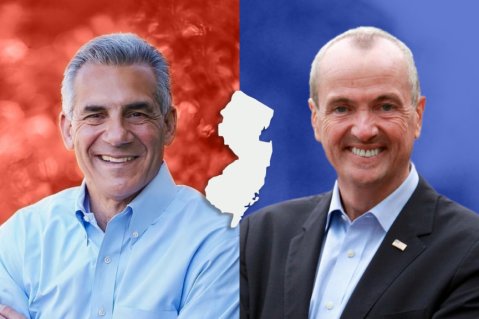Rutgers Helps Bring New Jersey Governor's Debate to the Public

Democratic Gov. Phil Murphy will face off against Republican challenger Jack Ciattarelli in the first gubernatorial debate tonight, an event Rutgers helped make happen. John Weingart, director of the Center on the American Governor at the Eagleton Institute of Politics, and Charles Menifield, dean of the School of Public Affairs and Administration, talked to Rutgers Today about the university’s role in the debate and how it all comes together.
What is Rutgers' involvement with the debates?
Weingart: Two centers in the university – the Eagleton Institute of Politics in New Brunswick and School of Public Affairs and Administration (SPAA) in Newark – collaborating with television stations in Philadelphia and Newark, WBGO-FM radio in Newark, Univision and the NJ Performing Arts Center, submitted the proposal for the first debate that ELEC (the New Jersey Election Law Enforcement Commission) thought was the best. Eagleton and SPAA have helped to publicize the debate and also asked Rutgers students in our programs to write questions they would like the candidates to address.
Menifield: A variety of teams were put together with various entities around the state. Our team (ABC, Rutgers SPAA, Eagleton Institute, NJPAC, Star Ledger, Advance Media, etc.) was selected first out of the six teams. Teams were selected based on their ability to reach large audiences and manage the debate professionally. We were asked to participate and manage student participation by the Kessler PR Group.
How far in advance does the preparation for the debate start?
Weingart: ELEC heard presentations on each proposal and selected the ones they thought best for each of the three debates at their public meeting held in Trenton on August 25.
Will the questions from Rutgers students be asked in the debate?
Weingart: Maybe. There are many more important topics than can fit in the 60-minute debate. The on-air TV hosts and panelists will make those difficult decisions as the debate proceeds.
How were student questions selected for consideration?
Menifield: This was a two-stage process. First, we asked Rutgers students on all four campuses to submit topics for the debate. From this list, a team of experts added additional topics and developed a series of questions. Second, we asked the students for very specific questions.
And who are the on-air hosts and panelists?
Weingart: This first debate will be moderated by Sade Baderinwas and Jim Gardner of WABC-TV in New York and WPVI-TV in Philadelphia, respectively. The panelists will be Adriana Vargas-Sino from Univision 41 and NJ Advance Media reporter Amanda Hoover.
Do televised debates typically influence the outcome of an election?
Weingart: In a very close contest, a very good - or very bad - performance can tip the balance. Whether or not that happens, debates are still valuable for helping to inform potential voters about the candidates and their views. In addition, they can draw more attention to the race that may help increase the turnout.
Do debates favor one candidate over another?
Weingart: When an incumbent is seeking re-election, as is the case this year, the challenger tends to be less well known and debates can help raise their profile.
Why do the Democratic and Republican nominees for New Jersey governor almost always participate in debates?
Weingart: New Jersey has a unique Public Financing Program under which a party nominee who raises at least $490,000 can receive up to $10.5 million in matching funds. A condition of this public funding is that the candidate commit to participate in two public debates with the other party's (or occasionally parties') nominee(s). A similar requirement for the nominees for lieutenant governor provides for one debate among those candidates.
The debate will be broadcast live tonight (Sept. 28) from 7 p.m. to 8 p.m. on the radio on WBGO-FM in Newark, on television on WABC-TV in New York and WPVI in Philadelphia, and on the internet on NJ.com.
Previous gubernatorial debates are available for viewing through the Center on the American Governor's NJN Broadcast Library.
